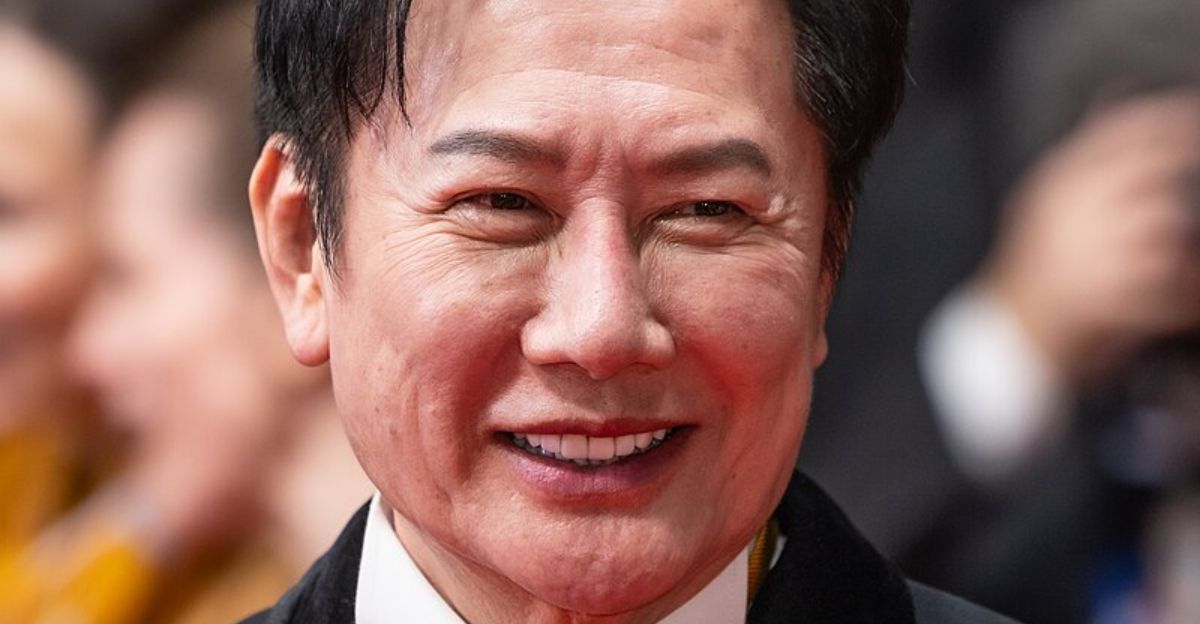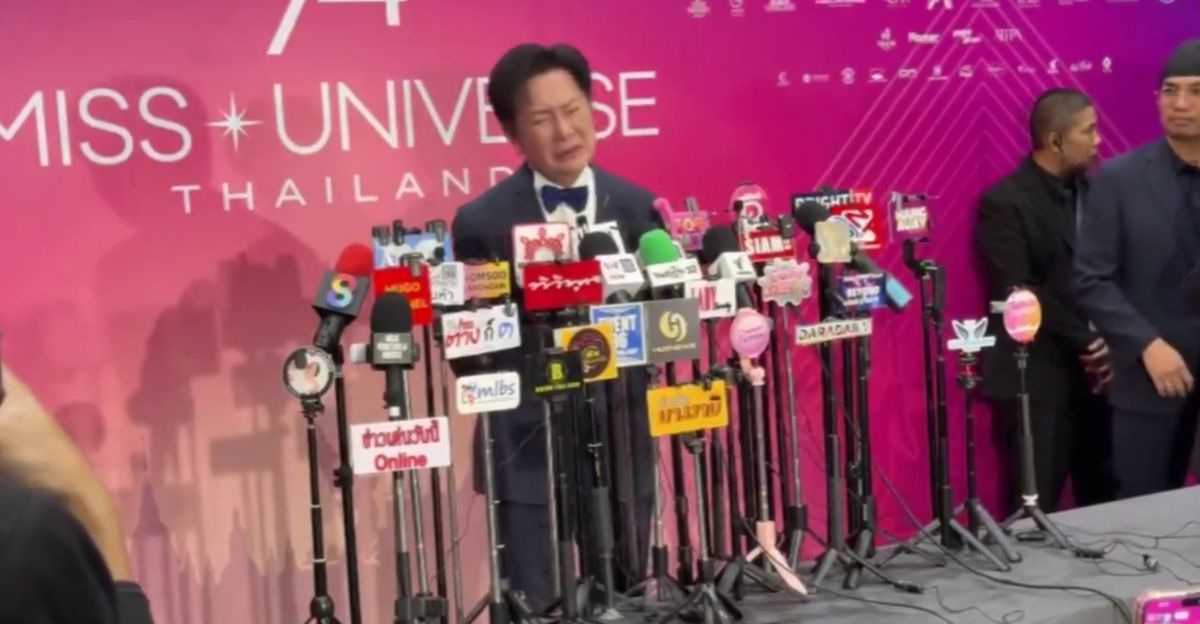
Police appeared as Jorge Figueroa lifted his coffee cup. Makeup artists froze. Thai uniforms descended on the hotel table—a scene one journalist later called “like an ICE raid in California.” Within hours, Mexico’s Miss Universe director was in detention.
The charge: his organization’s sponsorship of an online gambling app—criminalized in Thailand, a nation enforcing absolute gaming prohibition. This wasn’t political theater. This was retaliation wrapped in legal paperwork.
The Livestreamed Humiliation

On November 4, Fátima Bosch stood alone as 130 contestants watched. Nawat Itsaragrisil, Thailand’s Miss Universe director, called her a “dumbhead” for refusing to film gambling app promotions—accusing her of following her national director instead of his commands.
Bosch, trembling with controlled fury, responded: “You are not respecting me as a woman.” The room held its breath. Nawat ordered security to remove her. Then something unprecedented erupted. Nearly every contestant stood. Victoria Kjær Theilvig, reigning Miss Universe, led them out. One by one, they walked.
“This Is About Women’s Rights”

Victoria Kjær Theilvig’s voice carried weight that transcended pageantry. “This is about women’s rights,” the reigning queen declared. “This is not how you treat other women… Enough is enough.” Her participation in the walkout sent shockwaves through pageant governance. The sitting Miss Universe, whose platform commanded global attention, was publicly rejecting the organization that crowned her.
This wasn’t a contestant risking future opportunities—this was established authority validating every woman’s decision to refuse disrespect.
Locked Doors, Broken Trust

Nawat’s response to the walkout revealed the depths of his control impulses. He ordered security to seal the exits, trapping contestants inside during his tirade—an action that transformed pageant politics into something darker: physical confinement, psychological control, authority weaponized against the powerless.
Hours later, a tearful Nawat apologized, claiming he’d said “damage” rather than “dumb” and insisted he had “lost control.” But apologies cannot unlock doors that were deliberately closed. The damage was irreversible.
The “Rotten Apple” Speaks

Martha Cristiana, former Miss Universe Mexico director and actress, broke her silence with surgical precision. Figueroa was “the rotten apple,” she said—a person creating “problems with many young women who wanted to join the project” who “were not being treated well, they were being disrespected.”
She had resigned specifically because of irregularities linked to his conduct. Her sudden emergence as a corroborating witness transformed the narrative from pageant drama into organizational dysfunction.
Violence Allegations Surface

Michelle Domínguez, Miss Quintana Roo 2025, posted her own allegations: she was “a victim of violence at the hands of Jorge Figueroa.” She described manipulation, insults, and accusations that he had incited a fellow contestant to physically assault her, then blamed the victim by spreading false information about her character.
Her public account transformed private suffering into visible evidence. As Figueroa sat in Thai detention, allegations unraveled—not random complaints, but a pattern suggesting systematic abuse of power toward vulnerable young women under his authority.
The Sponsorship Disaster

How did a major international pageant approve a multi-million dollar sponsorship with an online gambling platform in a country where such sponsorships are criminalized? The Miss Universe Organization had greenlit Playtime, a Philippines-based gambling app, as an official partner—a deal worth potentially $2 million to $10 million.
Nawat had allegedly warned Miss Universe Organization leadership months in advance that this violated Thai statutes. They proceeded anyway. When Thai police raided the hotel, discovering contestants filming promotional content for the app, they seized materials and filed the complaint, triggering Figueroa’s arrest.
Thailand’s Absolute Gambling Ban

Thailand doesn’t merely discourage gambling—it criminalizes it with zero tolerance. The nation’s Senate had rejected casino legalization just weeks before the pageant, reinforcing a prohibition so absolute that even promotional activity triggers police intervention. Gambling sponsorships, common in Western pageants, become criminal enterprises under Thai law.
The Miss Universe Organization’s due diligence failed catastrophically. Either legal counsel didn’t consult Thai statutes, or financial pressure overrode legal warnings. Either way, contestants became collateral damage in organizational negligence.
Figueroa’s Flight

Before his arrest, Jorge Figueroa addressed the rising tensions in an interview with Mexico’s “De Primera Mano.” He said the problems were “really with Miss Universe Thailand, with the management—directly with Mr. Nawat.” Figueroa explained that “respect” should guide their relationship, but accused Nawat of lacking that value.
Importantly, Figueroa confirmed he had already left his hotel, hinting he may have been trying to avoid the police as the situation grew more serious..
Breakfast Interrupted

The arrest itself became symbolic of organizational collapse. Figueroa and Mexican makeup artists were taken into custody while having breakfast—a deliberately public act of detainment. One journalist described it as “like an ICE raid in California,” emphasizing the force and spectacle of police removing Mexican nationals from a hotel lobby.
The targeting of the Mexican delegation rather than Miss Universe Organization executives in the United States signaled deliberate retaliation against Figueroa specifically.
The Pattern Nobody Could Ignore

As Figueroa sat in detention, Nawat’s history of public disrespect toward women became mainstream conversation. In 2016, Miss Iceland 2015 Arna Ýr Jónsdóttir alleged that Nawat told her she was “too fat” and needed to lose weight before competing; she withdrew in protest. In 2022, he publicly criticized Miss Vietnam 2022’s body on a livestream, calling her “too long a torso and too short legs.” In 2025, he body-shamed Miss Grand International 2024 winner Rachel Gupta on Instagram with “Before” and “After” posts insinuating surgical intervention.
The November 4 walkout wasn’t an aberration—it was the moment contestants collectively decided accountability was non-negotiable.
130 Women Stand Together

The November 4 walkout resonated globally on social media. Contestants from nations worldwide—many competing in Miss Universe for the first time—had witnessed something revolutionary: a collective refusal to absorb disrespect silently. The women didn’t scatter in fear. They stood. They walked. They posted. They testified.
For an event built on celebrating female empowerment, the pageant had inadvertently created its most powerful moment not on stage, but through organized defiance against authority.
The Organization’s Damage Control

Miss Universe Organization president Raúl Rocha Cantú moved swiftly to contain catastrophic reputational damage. Nawat would be “restricted or eliminated entirely” from remaining activities, Rocha announced, describing his behavior as “public aggression” and “serious abuse.”
Preliminary schedules were modified to “avoid any interaction” between Nawat and contestants. Yet the organization’s silence on systemic reform raised questions: Was this crisis management, or capitulation designed to minimize further exposure?
Released, But Questions Remain

All detainees were released after questioning, but the legal entanglement cast a shadow that was unmovable over the competition. The Miss Universe Organization and Mexican franchise issued no comprehensive public statements clarifying the investigation status, whether additional charges would emerge, or what systemic reforms might follow.
Figueroa’s release from detention didn’t resolve the deeper questions: Would he be allowed to attend the finale? Would Thai authorities pursue additional charges?
Fátima Bosch’s Quiet Defiance

Fátima Bosch continued to advance through preliminary competitions with grace, despite the organizational chaos surrounding her entry. At the final event, observers noted that she held back tears but maintained her composure, refusing to allow external dysfunction to fracture her competitive focus. “I just try to be kind. I’m trying to keep my best,” she told reporters, embodying quiet defiance.
She became the human embodiment of pageant contradictions—a contestant striving for a crown while her own organization’s director faced detention and public allegations of misconduct.
The Alleged Pattern of Control

Figueroa allegedly used intimidation and disrespect to manage Mexican contestants, creating an environment where fear overshadowed aspiration. Cristiana’s “rotten apple” characterization and Domínguez’s violence allegations suggested systematic abuse of power rather than isolated incidents.
The critical question shifted: How many other pageant directors operate similarly, unchecked, because contestants fear retaliation or career-ending consequences?
What “The Power of Love” Revealed

Miss Universe 2025 was supposed to celebrate “The Power of Love.” Instead, it exposed the powerlessness of women operating within systems designed by men who wielded authority without accountability.
The casino sponsorship blunder revealed organizational dysfunction at the highest levels. The onstage confrontation exposed contempt for boundaries. The walkout revealed contestants’ readiness to risk their competitions for collective dignity. And Figueroa’s arrest became the visible consequence of invisible corruption.
A Generational Reckoning

The November 4 walkout signaled something deeper than pageant politics: a generational refusal to accept authority without question. Young women competing in the Miss Universe pageant had watched social movements demand accountability from powerful men. They had internalized that solidarity mattered more than individual crowns.
When Nawat locked the doors, called Bosch names, and leveraged his position to demand obedience, they recognized the pattern and collectively rejected it.
November 21: The World Watches

Miss Universe 2025 will air live on Telemundo and Peacock, drawing an estimated 500 million viewers around the world. Fátima Bosch will step onto the stage carrying Mexico’s hopes—and the weight of standing against organizational turmoil.
The central question remains: Will this pageant finally reckon with locked doors, onstage confrontations, and accusations of mistreatment as the world watches
The Crisis Nobody Expected, Everyone Will Remember

Miss Universe 2025 enters its final stretch marked not by glamour and anticipation, but by scandal, detention, and unprecedented contestant solidarity. What unfolded in Bangkok exposed the pageant industry’s vulnerability to crisis—how quickly systems built on control could collapse when women refused to absorb disrespect silently.
As November 21 approaches, the world will watch not just to see who wears the crown but to witness whether an organization can survive the consequences of its own failures. The answer would forever reshape pageant history.


